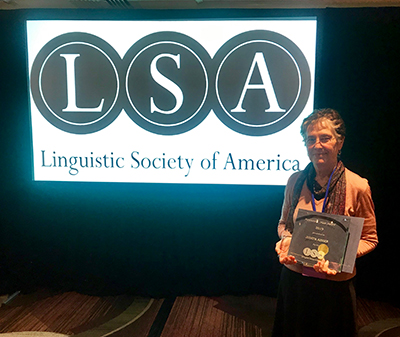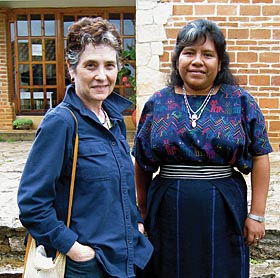Campus News
Professor honored by Linguistic Society of America for decades of work on endangered languages
UC Santa Cruz emeritus professor of linguistics Judith Aissen was awarded the prestigious Kenneth L. Hale Award last week in New York City at the 2019 Annual Meeting of the Linguistic Society of America (LSA). The LSA is the major professional society in the United States that is dedicated to the scientific study of language.


UC Santa Cruz emeritus professor of linguistics Judith Aissen was awarded the prestigious Kenneth L. Hale Award last week in New York City at the 2019 Annual Meeting of the Linguistic Society of America (LSA).
The LSA is the major professional society in the United States that is dedicated to the scientific study of language.
It plays a critical role in supporting and disseminating linguistic scholarship, as well as facilitating the application of current research to scientific, educational, and social issues concerning language.
“In her work on Mayan languages, which spans more than forty years, Judith Aissen has made outstanding contributions in language documentation, linguistic theory, and the mentoring of indigenous linguists,” the LSA citation noted. “Aissen’s published works are models of theoretically informed linguistic description; viewed another way, they are models of empirically-based theoretical work.”
“Aissen has been a stalwart, dedicated mentor of indigenous linguists in Mexico and Guatemala, teaching seminars and workshops,” the citation added. “In short, Aissen has earned this award for her energetic documentation of Tzotzil and other Mayan languages, her success at bringing these languages to bear on linguistic theory, and her commitment to the nurturing of indigenous linguists.”
Aissen began studying Mayan languages in 1972 as a linguistics graduate student at Harvard, where she participated in a long-term anthropology project sponsored by the National Science Foundation. She traveled to San Cristobal de las Casas, a colonial town in the highlands of Chiapas, where she conducted fieldwork with native speakers.
After joining the UC Santa Cruz faculty in 1983, Aissen continued to return to San Cristobal in the summers to carry out her own research. She eventually began teaching workshops under the auspices of research organizations in Mexico and Guatemala with the goal of helping to preserve the threatened Mayan languages.
Aissen noted that her LSA award honors the linguist Ken Hale (1934-2001), whose work brought indigenous languages to bear on issues in theoretical syntax, thereby transforming a field which had previously been dominated by the world’s major languages. Hale was also a forceful advocate for the need to train native speakers of indigenous languages as linguists so that they could participate fully in the documentation and analysis of their own languages.